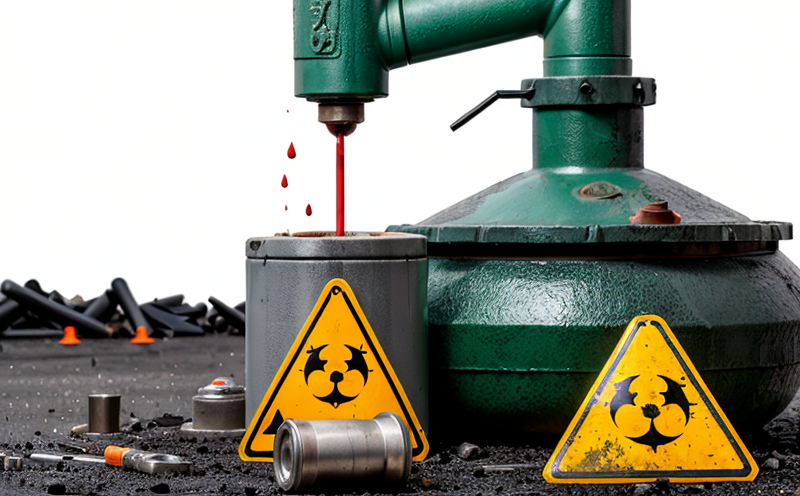Polymer Hazardous Residual Compound Analysis
The analysis of hazardous residual compounds in polymers is a critical process within the chemical testing sector. This service ensures that materials used in various industries are free from harmful substances, thereby protecting human health and the environment. The demand for this type of analysis has grown due to stricter regulations and increasing consumer awareness about product safety.
At Eurolab, we employ advanced analytical techniques such as Gas Chromatography-Mass Spectrometry (GC-MS), High Performance Liquid Chromatography (HPLC), and Fourier Transform Infrared Spectroscopy (FTIR) to detect even trace amounts of hazardous compounds. Our expertise ensures that the results are accurate and reliable, which is essential for compliance with international standards like ISO 17025.
The process begins with thorough sample preparation, where we ensure that the polymer samples are representative and free from contamination. This step is crucial in providing precise analysis results. Our experienced team of chemists then conducts a detailed examination using state-of-the-art instrumentation to identify any hazardous compounds present.
Once identified, we perform additional tests to determine the concentration levels of these compounds. This information is vital for manufacturers and suppliers to make informed decisions about their products' safety and compliance with regulatory requirements. The analysis also helps in identifying potential risks during product lifecycle management.
The importance of this service extends beyond mere compliance; it plays a key role in enhancing brand reputation by ensuring that the products are safe for consumers. Moreover, it supports environmental sustainability efforts by helping to reduce pollution from hazardous waste.
Eurolab's commitment to excellence is reflected in our rigorous quality assurance processes and continuous improvement initiatives. We invest heavily in cutting-edge technology and skilled personnel to stay at the forefront of this rapidly evolving field. By partnering with us, businesses can trust that they are receiving top-tier analytical services tailored specifically for their needs.
Our clients range from small startups to large corporations across various sectors including manufacturing, pharmaceuticals, construction, and consumer goods. They rely on our polymer hazardous residual compound analysis service to maintain high standards of quality and safety in their operations.
Industry Applications
| Application Area | Description | Significance |
|---|---|---|
| Aerospace & Defense | Ensuring the safety of aircraft and defense equipment by identifying hazardous compounds that could affect performance or pose health risks. | Critical for maintaining operational integrity and ensuring personnel safety. |
| Consumer Goods | Verifying the absence of harmful substances in consumer products to safeguard public health. | A key factor in building brand trust and compliance with international regulations. |
| Construction | Detecting hazardous compounds in construction materials to prevent adverse effects on workers' health and the environment. | Supports sustainable practices and regulatory compliance within the industry. |
| Pharmaceuticals | Guaranteeing that medical devices and pharmaceutical products do not contain harmful substances. | Essential for patient safety and product efficacy. |
| Automotive | Identifying hazardous compounds in automotive components to ensure vehicle safety and reduce environmental impact. | Aids in developing eco-friendly vehicles while enhancing overall safety standards. |
| Electronics & Appliances | Checking for harmful substances in electronic devices to protect users from potential health hazards. | Promotes safer use of technology and aligns with global environmental policies. |
| Biofuels | Monitoring the presence of hazardous compounds in biofuel blends to ensure they meet quality standards for use. | Contributes to sustainable energy production and reduces reliance on fossil fuels. |
| Plastics & Packaging | Determining the levels of hazardous substances in plastics and packaging materials to enhance product safety and recyclability. | Facilitates better waste management practices and promotes circular economy principles. |
The above applications illustrate how our polymer hazardous residual compound analysis service is integral across multiple industries. By addressing specific challenges within these sectors, we contribute significantly towards creating safer environments both for humans and the planet.
Eurolab Advantages
At Eurolab, we pride ourselves on delivering unparalleled expertise in polymer hazardous residual compound analysis. With years of experience and state-of-the-art facilities, our team is well-equipped to handle complex samples from diverse industries. Our services are characterized by precision, accuracy, and reliability - qualities that set us apart from competitors.
We offer rapid turnaround times without compromising on quality, allowing clients to receive timely results which can be crucial for decision-making processes. Additionally, we provide comprehensive reports detailing our findings along with recommendations based on these analyses.
Our commitment to innovation ensures that we utilize the latest technologies and methodologies available in this field. This not only enhances the accuracy of our tests but also helps us stay ahead of evolving regulatory requirements.
Moreover, Eurolab offers customized solutions designed specifically for individual clients' needs. Whether it's a one-off analysis or ongoing monitoring programs, we have packages tailored to meet your specific requirements.
Environmental and Sustainability Contributions
The detection of hazardous residual compounds in polymers is not just about meeting compliance; it’s also an important part of environmental stewardship. By identifying these potentially harmful substances early on, we can take proactive measures to mitigate their impact on ecosystems.
This service supports sustainability initiatives by promoting the use of safer materials and practices throughout product lifecycles. It encourages recycling programs that minimize waste disposal issues associated with hazardous compounds. Furthermore, it contributes towards reducing emissions related to production processes involving these substances.
Our work aligns closely with global environmental policies such as the United Nations Sustainable Development Goals (SDGs). By focusing on preventing pollution at source, we contribute significantly to achieving Goal 12: Responsible Consumption and Production.
In conclusion, Eurolab’s polymer hazardous residual compound analysis service plays a vital role in fostering safer environments while supporting sustainable development goals. It is more than just compliance; it's about creating lasting positive impacts for future generations.





